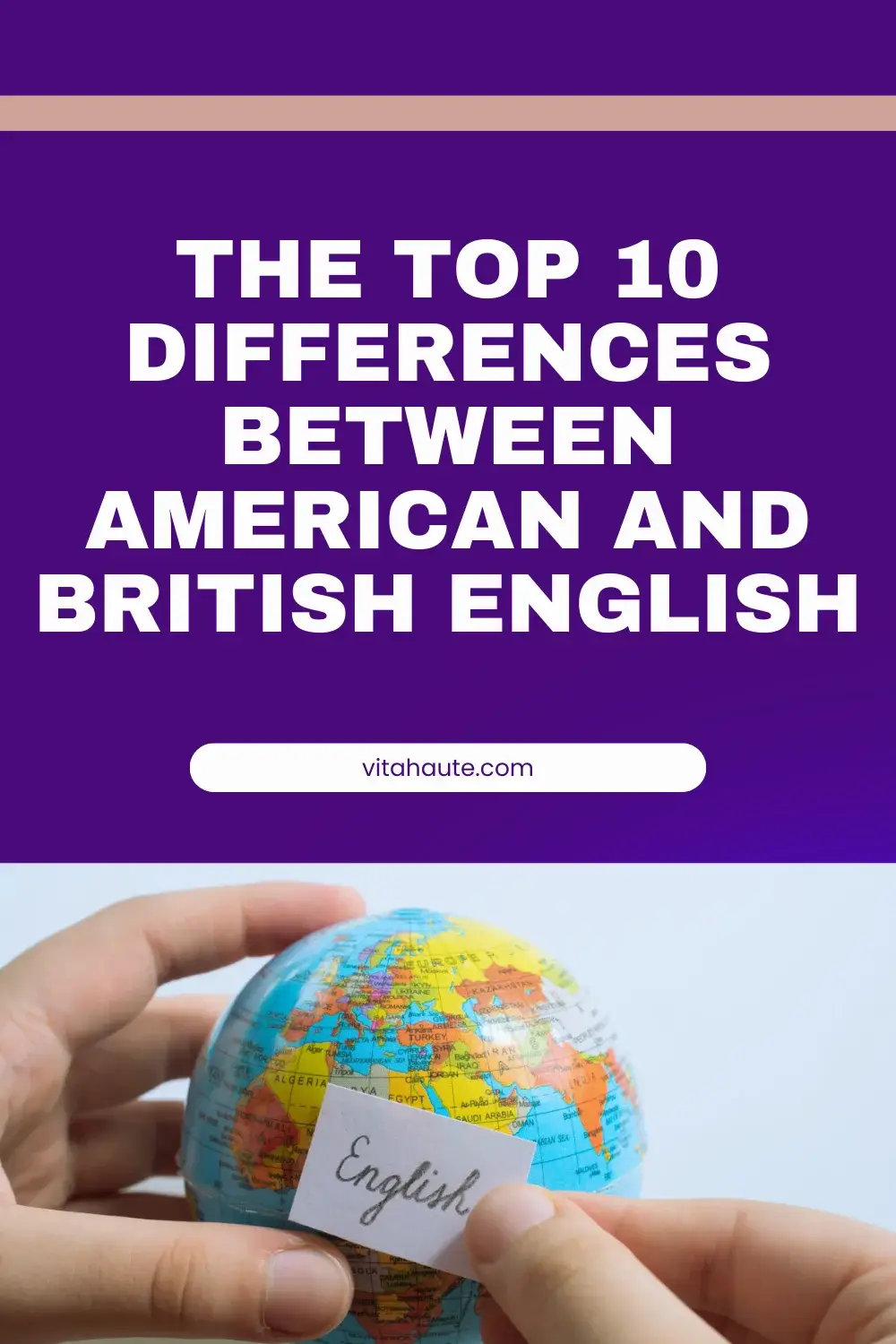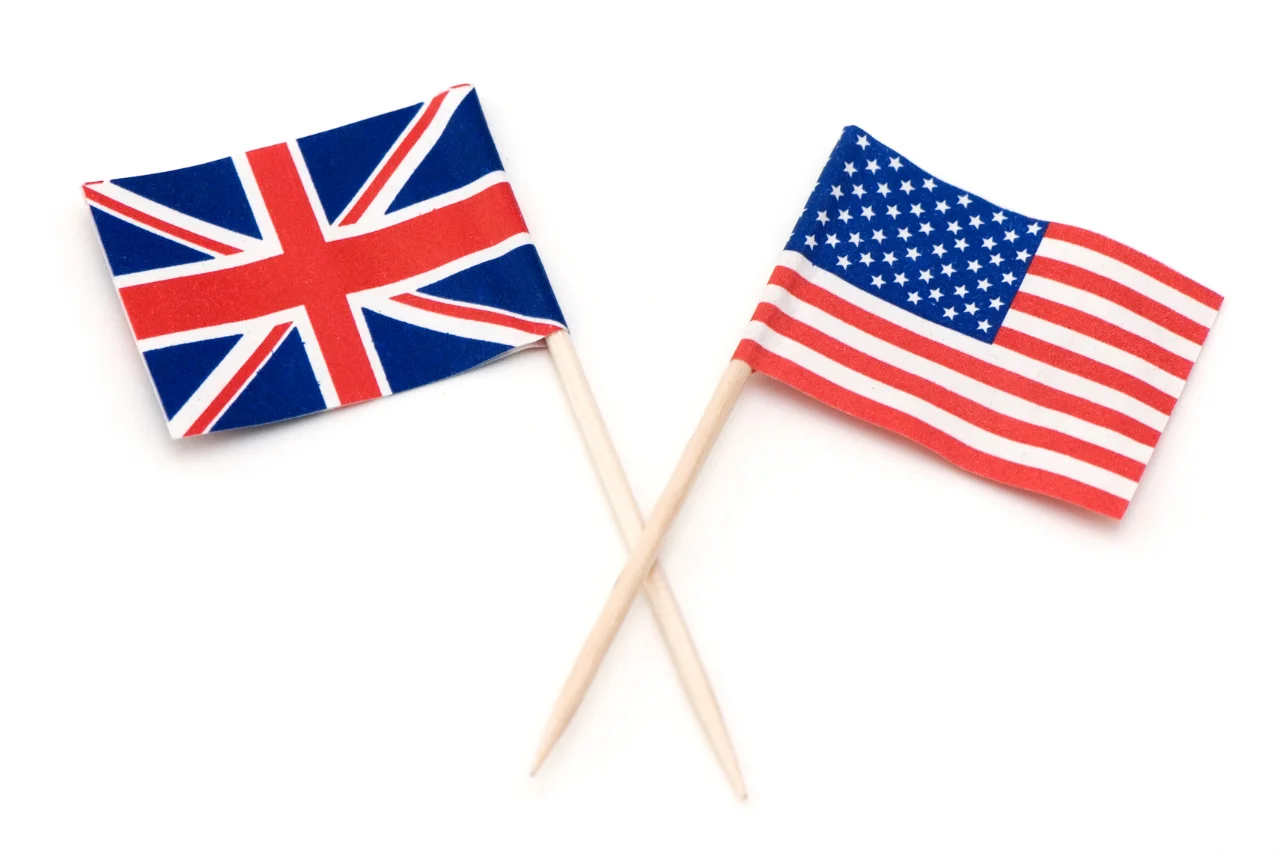English is a language with a global reach, spoken by over 1.5 billion people worldwide. Not all English speakers use the language in the same way. American and British English, two of the most widely spoken variants of the language, have many differences in spelling, pronunciation, and vocabulary. These differences can lead to communication challenges between speakers of the two varieties.
For example, consider this sentence, which a British English speaker might say:
I ate some jelly moments before the football match, then realized I’d forgotten to bring my trainers.
An American listener might find it confusing, because:
1) In England, people use the word “jelly” for what Americans call Jell-O—a jelly-like sweet usually served cold, with bright colors and fruity tastes. If you’re looking for a fruit spread (like what you put on bread), the English word is “jam.”
2) The terms “soccer” and “football” refer to the identical game in many regions of the globe, but they can suggest separate things based on the location. In countries such as England, Spain, and Brazil, “football” is the sport played with a round ball that’s mostly kicked. In North America, “football” usually refers to “American football”–a very different game played with an elliptical object, protective gear, and lots of muscular collision.
3) In England, the term for footwear made for games and physical activity is “trainers.” In America, these are called “sneakers.”
He’ll likely think the Englishman meant that he’d gone to an American football game with his trainers, and that is, people who help sportsmen to improve their physical health and abilities.
Now, on his way out the door, if the customer further states something like, “Now that I think about it, I just may still have my trainers in my boot,” at this point, the bartender might think that both of them have gone mad. “Boot” is the British word for “trunk” in America, and many people know the differences, but one can imagine the hilarity that can ensue in certain situations.
Keep reading to read more about the differences between British and American English.
This post contains affiliate links. Please read our disclosure.

1. Spelling ✍️
There are also several spelling differences between British and American English, such as “colour” vs “color,” “favour” vs “favor,” and “centre” vs “center.” American lexicographer Noah Webster played a key role in shaping American English spelling. Many British words have kept the older form. His goal was to make American spelling different than in British English.
The following are words with different spellings in England and the US:
| 🇬🇧 British English | 🇺🇸 American English |
|---|---|
| Favour | Favor |
| Travelling | Traveling |
| Realise | Realize |
| Analyse | Analyze |
| Defence | Defense |
| Oecology | Ecology |
2. Vocabulary 📖
As we have already covered, different words are sometimes used to refer to the same thing. Other words besides those that we have mentioned include “lorry,” which in British English is equivalent to “truck” in American English, while “flat” in British English is equivalent to “apartment” in American English. There are thousands of such differences, but here are only a few more:
| 🇺🇸 American English | 🇬🇧 British English | |
|---|---|---|
| 🏠 | Apartment | Flat |
| 🍪 | Cookie | Biscuit |
| 🍟 | Fries | Chips |
| ⛽ | Gasoline | Petrol |
| 🔦 | Flashlight | Torch |
| 🍬 | Candy | Sweets |
| 🚰 | Faucet | Tap |
| 🧥 | Sweater | Jumper |
3. Pronunciation 🗣️
Pronunciation can also vary between British and American English, with differences in stress, intonation, and vowel sounds. For example, the word “schedule” is pronounced with a hard “k” sound in American English, while it is pronounced with a soft “sh” sound in British English.
Here are a few examples of words pronounced differently in the two countries:
British vs. American Pronunciations
American pronunciation
British pronunciation
American pronunciation
British pronunciation
American pronunciation
British pronunciation
Other words pronounced differently depending on the speaker’s country include:
1. Tomato
2. Privacy
3. Mobile
4. Lever
5. Route
6. Herb
7. Either
These are just a few examples; there are many more words with different pronunciations in American and British English.
4. Grammar 📚
There are also some grammatical differences between the two varieties of English. For example, in American English, collective nouns are often treated as singular, while in British English they are more commonly treated as plural.
For example, in England one might say:
The family are arriving today.
The family would be considered as plural. In America, they would say:
The family is arriving today.
Past Simple vs Present Perfect
- British English: Often uses the present perfect for actions that have relevance to the present.
Example: I’ve lost my phone. - American English: May use the simple past instead.
Example: I lost my phone.
- British English: Often uses the present perfect for actions that have relevance to the present.
There are also other grammar differences, ranging from the use of prepositions to how collective nouns are treated.
5. Date Format 📅
In British English, the date format is typically day/month/year, while American English uses a month/day/year format. This difference can lead to confusion, particularly when writing dates numerically.
So in England, June 2, 2020, would be written as follows:
2/6/2020
Americans would write the same day as:
6/2/2020
6. Time Format ⌚
British English typically uses a 24-hour clock format, while American English uses a 12-hour clock format with AM/PM notation.
In colloquial language, however, the British generally prefer to go on the twelve-hour clock. So you might see “14:00” for 2 PM on a bus ticket, but people would still say “2 o’clock” in daily conversation.
7. Punctuation ❗️❓
There are also some differences in punctuation, with British English using single quotation marks for direct speech, while American English uses double quotation marks.
Single Quotation Marks in British English
In British English, single quotation marks (‘ ’) are generally preferred over double quotation marks (“ ”) for quoting speech or text. Here’s how it works:
1. Basic Quotation
- British: ‘I’m going to the market,’ she said.
- American: “I’m going to the market,” she said.
2. Quotes Within Quotes
When there’s a quote inside a quote, British English flips the style—so double quotes go inside single quotes:
‘Did he really say “I don’t care” in that tone? she asked.
3. Punctuation Placement
In British English, punctuation follows a logical rule:
- If the punctuation is part of the quote, it stays inside.
- If it isn’t, it goes outside.
Examples:
- He called it ‘a masterpiece’.
- She said, ‘Let’s go.’
(American English usually keeps commas and periods inside quotes regardless.)
4. Titles or Irony
Single quotes are also used to indicate irony or highlight a term:
He said it was a ‘brilliant’.
In British English, punctuation is more logical:
- If the punctuation is part of the quote, it stays inside.
- If it’s not, it goes outside.
8. Prepositions ➡️
Prepositions are another area where British and American English part ways. For example, British English tends to use “at the weekend,” while American English prefers “on the weekend.” In the UK, someone might say they’re “in hospital,” but in the US, it’s more common to hear “in the hospital.” You’ll also notice Brits saying “different to” or “different from,” whereas Americans usually stick with “different from.”
9. Idiomatic Expressions 🗯️
There are many idiomatic expressions that differ between the two varieties of English. For example, in British English, one might say “Bob’s your uncle” to mean “there you have it,” while in American English, one might say “piece of cake” to mean “easy.” Other expressions used in England include, “Taking the mickey,” for the American equivalent, “Pulling your leg”. The british also use the saying, “To throw a spanner in the works” for “To throw a wrench in the works”. Another idiom, “Penny for your thoughts”, is popular in both countries, though it is of British origin.
10. Slang 😎
Finally, there are many differences in slang and informal language between British and American English, with different words and expressions used to mean the same thing.
British: Brolly vs American: Umbrella (A device used to protect oneself from rain.)
British: Biscuit vs American: Cookie (A sweet, baked treat.)
British: Mate vs American: Buddy (A close friend or companion.)
British: Cheers* vs American: Thanks (An expression of gratitude.)
British: Crisps vs American: Chips (Thin slices of potato that are fried and salted.)
*In England, it can also be said as a toast or a goodbye.
Tips to Learn Differences Between American and British English
Those interested in learning the differences between American and British English should consult dictionaries, grammar guides, language blogs, and radio and TV shows, which can help you understand the distinctions. You could even try a language club, where you can converse with natives of both England and the USA. Whatever method you decide on, know that the distinctions aren’t all that major. With practice and enough exposure both versions of English, you’ll find that both versions are more similar than different. And that in most cases, you won’t find yourself in a difficult position as the bartender and his patron.
Think you know world culture? Explore our quiz hub and test yourself on fascinating facts from around the globe.
Daniel Zohar is a passionate entrepreneur and digital marketing expert with a strong focus on business and affiliate marketing. With over 10 years of experience in the industry, he has gained valuable insights and strategies that he is eager to share with others. Through his writing and speaking, Daniel aims to help others achieve success in business and affiliate marketing, using his own experiences as a guide. In addition to his work as a writer and speaker, he is a successful business owner and consultant, helping companies and individuals reach their goals in the digital world.
You Might Also Like:
- How to Find the Right Influencer for Your Brand
June 23, 2024 - 9 Best Niches for Affiliate Marketing in 2025
January 7, 2025 - 16 Affordable Hosting Options for Your Blog in 2025
February 21, 2025 - Comedy Sells: How to Make Your Business Memorable with Humor
January 6, 2023 - 100 of the Most Beautiful Words in the English Language
April 8, 2024
